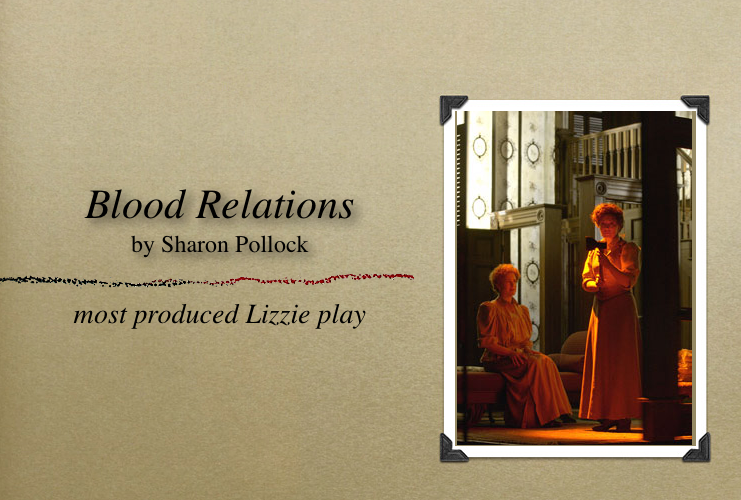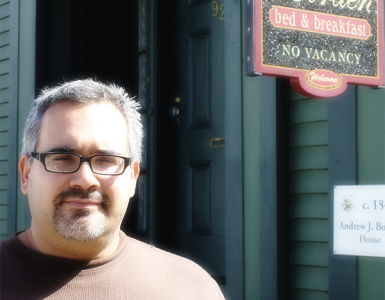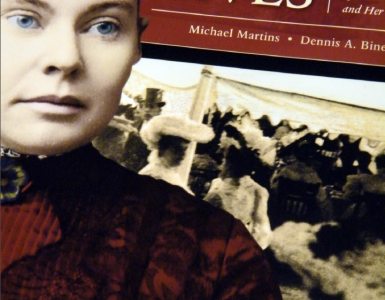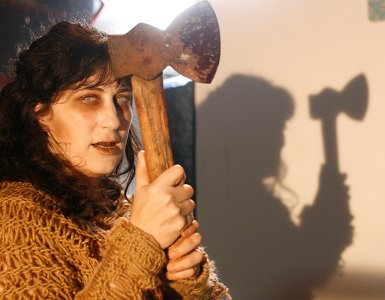by Stefani Koorey
First published in December/January, 2004-2005, Volume 1, Issue 6, The Hatchet: Journal of Lizzie Borden Studies.
Sharon Pollock’s works for the stage have been produced throughout Canada and around the world. She is the recipient of numerous awards recognizing excellence in drama including The Canada Australia Award for her body of work, The Martha and Harry Cohen Award for significant and sustained contribution to theatre, ACTRA Nellie Award for national radio drama, the Sheaf Award for national television, and a Japan Foundation Award. She is a two-time winner of the Governor General’s Literary Award for Drama for her plays DOC and BLOOD RELATIONS.
She has served as head of The Playwrights’ Colony at Banff, associate director at Manitoba Theatre Centre and Stratford Festival Theatre, artistic director of Theatre New Brunswick, Chair of the Advisory Arts Panel at Canada Council, and artist in residence at The National Arts Centre, has directorial credits at numerous theatres across the country, and has taught and led playwriting and theatre workshops and labs both within and outside Canada.
SK: What drew you to the story of the Borden murders, and Lizzie Borden in particular, as subject matter for a play?
SP: Prior to working in the theatre I was married to a violent man. I spent a great deal of time planning, quite literally, murderous schemes to rid me of him. I implemented none of them for none struck me as suitably foolproof. I crept into the night when it was forcibly brought home to me that in all likelihood I was cast as the murderee, not the murderer in my little drama. Had I been more inventive and less irresolute I might have been the beneficiary of a large insurance policy and the owner of quite a nice house in the country. I would not have killed for financial gain or the acquisition of real estate. I would not have killed to prevent injury to myself. I would have killed to prevent a violation that was far more frightening and threatening than any blow. Physical violence against my person was only its outward manifestation. I would have killed to maintain my sense of self. I believe it might have been the same with Lizzie. Although I did not realize at the time I began the play I think that’s what drew me to Miss Lizzie and the Borden murders.
SK: You changed the relationship of the visiting uncle from John Morse (Lizzie’s blood uncle) to Harry (Abby’s brother). I was surprised that I didn’t mind the alteration to history as it only increased the pressure on Lizzie by surrounding her with enemies. Can you describe the thought processes you went through in making this adjustment to the story?
SP: It seemed to me that the Uncle of the first wife would look out for his nieces’ interests, they being “family” but historically this didn’t appear to be so. And the Uncle, although important, is a minor character and I didn’t want to get into complicated motivations to explain his actions. He wasn’t the focus. It made more sense in accessible human motivation and dramatic possibility that the Uncle, acting in his own and Mrs. Borden’s interests, was allied with Mrs. Borden because he was her brother. It explained his antagonism towards Lizzie, increased the pressure on her and on Mr. Borden and increased the power of Mrs. Borden.
SK: You have a Nance O’Neil character in the play but avoid all controversy by staying away from defining their relationship in any specific way. Was this your original idea for the actress character or did the play evolve into this? In other words, was there a time when you considered these two women in any other way than the way you portray them?
SP: I believe the Actress and Miss Lizzie have an intimate and physical relationship – but I also like subtlety. I tried to seed the play with text and sub-text that supports that interpretation without dictating it. If, for whatever reason, a production chooses “they’re just good friends” the play still works. Controversy doesn’t concern me. I felt there was a danger in pushing or playing the intimate angle too strongly for then it becomes a “lesbian play” with lesbianism becoming the explanation for the murders. Life is more complex than that. I do think the play is richer when the Actress and Miss Lizzie are more than “just good friends.” It raises the stakes around the question “did you?” because the answer threatens their relationship. And I like plays that hint at things without spelling them out. In the end it’s up to the director and production as to which way they want to go.
SK: What books or documents on the case influenced your creative process? Did you read any of the other Lizzie plays that in print to direct your focus?
SP: I can’t say any one document or book had a major influence. I avoided any plays or films but read pretty well everything ever printed in the English language, both non-fiction and fiction in forms other than drama. As a rule my process is to read and research, and then to put that research away. I don’t allow myself to refer to it once I’m writing the play. I’m not interested in writing history. But I’m interested in contemporary questions reflected in events and/or people who have come before, are here now, and might come after. I’m looking for the interior of an historical or current event or person and I make a play from what I glean from that exploration. The external, which I think of as the facts, I may discard, alter, or invent.
SK: Are there any autobiographical references in Blood Relations?
SP: I would say there are autobiographical echoes in Blood Relations. One would be Miss Lizzie’s inability (and lack of desire) to conform to what society and family expect of her.
SK: Blood Relations was written about twenty-three years ago and still enjoys a significant production life. What about this case and your play makes it so timeless and appealing to audiences?
SP: I believe the actual case is timeless because of our inability to accept or rationalize the contradiction between who Miss Borden seemed to be and what she must have done. It’s better to deny she did it than examine why she did it for that might tell us things we don’t want to know about ourselves, or so a jury of her peers, all men, decided. The use of an axe as the murder weapon has something to do with it as well. I suspect if Lizzie had poisoned papa and step-mama she would have been convicted and forgotten. As for Blood Relations, the mythic profile of Lizzie Borden and the murders, the feminist aspect, the multiple layers of meaning and the play on conventions of theatre created by the role exchange, the mystery of whodunit, the trick of answering and not answering the question “did you?” at the same time; the family conflict; and the funny bits – I think all of this engages an audience. And the audience can be fairly broad. Some like the murder/mystery aspect; others the feminist angle; others the theatricality set up by the role exchange and structure. The play has good roles for women and interesting possibilities for lighting and design. I think Lizzie’s struggle to be her own person still resonates today, and I hope the dialogue has merit.
SK: Are there any other historical events that have fascinated you enough to write a play about them?
SP: Oh yes, many do. Saucy Jack springs from Jack the Ripper; Fair Liberty’s Call from events in the American Revolution; One Tiger to a Hill from a hostage-taking in a federal prison; Walsh draws on Sitting Bull and the Sioux’ time in Canada after the Little Big Horn; Angel’s Trumpet on Zelda and Scott Fitzgerald; Moving Pictures about Nell Shipman, a forgotten silent film star; End Dream, the unsolved murder (or suicide?) of a nanny in a drug baron’s home in Vancouver 1924; I won’t go on, you get the picture.
SK: Blood Relations was performed at the Centennial Conference in Fall River in 1992 and you presided over a Q&A. What memories do you have of those events that you could share with the readers of The Hatchet?
SP: Blood Relations was performed at the Centennial Conference in Fall River in 1992 but I wasn’t there so did not preside over a Q & A.
SK: How many productions of Blood Relations have been done to date? Any foreign productions of note?
SP: I don’t count the number of productions so the most I can say is “a lot.” They pay my mortgage and feed my menagerie of cats and dogs. The Hudson Theatre’s production in New York, with Marti Maraden and Dana Ivey, was particularly good as was a London production at the Red Lion. Canadian productions at The National Art Centre, The Grand Theatre and The Shaw Festival were also ones of note because of conceptual differences in the directors’ “take” on the play.
SK: You are an actress as well as an award-winning playwright. Have you ever performed in Blood Relations? If so, which part? And if so, why that part in particular?
SP: I played Miss Lizzie in Theatre Calgary’s production. I wouldn’t say it was exactly type casting but it was the character to whom I felt closest, not as the playwright but as myself – if you know what I mean by making that distinction. I found it interesting that as an actress I discovered and played facets of Miss Lizzie that were grounded in the text but which I as the playwright had not consciously written into the text. I believe that although the playwright may be the creator of the script a play lives in performance. A good play and production transcend the conscious intentions of the playwright.






